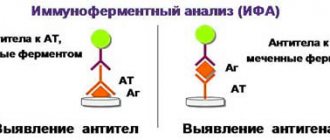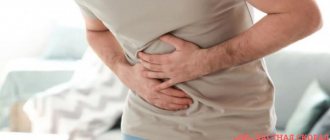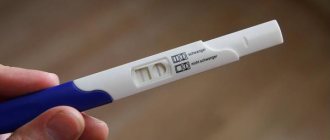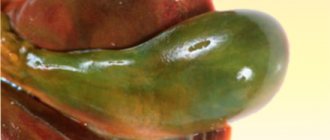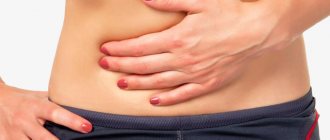Moiseeva Tatyana Nikolaevna
Head of the Department of Pediatrics, allergist-immunologist
We will tell you why colic begins. After that, we will explain how to deal with them.
Colic can be a consequence of:
- Stressful situation in the family, mother's anxiety
- Food allergies to the diet of a nursing mother. In this case, in addition to colic, the baby often develops a rash, usually redness and peeling of the skin.
- Transient lactase deficiency is usually characterized by loose stools (sometimes green).
- Swallowing air during feeding.
- The formation of intestinal flora after birth and the start of breastfeeding or its changes, for example, against the background of diseases, taking antibiotics.
- Urinary system infections.
Intestinal colic
If a child screams and cries bitterly, strains a lot, blushes, twists his legs, sleeps poorly and refuses to eat, he may have colic. They appear due to the accumulation of gases in the intestines.
In this case, the tummy becomes inflated like a balloon, the seething in it is felt even if you put your hand on it; The baby spits up the milk and the stool may turn greenish. Most often, colic appears in the evening. Parents can encounter this problem at any age of the child, starting from his stay in the maternity hospital. There are several main causes of colic in infants:
- immaturity of the digestive system;
- constipation;
- violation of the diet by a nursing mother;
- improper attachment of the baby to the breast - he swallows air;
- Mom takes antibiotics.
To help the baby, you can do a circular massage of the tummy in a clockwise direction, as well as light gymnastics: put the baby on his back and bend his legs, gently pulling them towards his chest. These simple methods will help stimulate bowel function and get rid of gas. To prevent colic after feeding, it is worth holding the baby in an upright position so that he can get rid of swallowed air.
A nursing mother should exclude chocolate, brown bread, cabbage, legumes and other foods from her diet that cause gas formation in the intestines. It is better to replace irritating drinks like tea and coffee with herbal teas - for example, brew chamomile.
If the mother is sick, then, in agreement with the pediatrician, you can temporarily transfer the baby to an adapted milk formula. Valio Baby baby food consists entirely of natural ingredients and contains GOS prebiotics (galactooligosaccharides) - similar to those found in breast milk. Prebiotics are needed for good digestion and strong immunity of the baby.
#PROMO_BLOCK#
Colic mixture. Which formula is best for colic?
If the newborn is bottle-fed, if colic occurs, you can discuss with your doctor the selection of a more suitable formula for the baby. The usual mixture with whole milk protein should be replaced with a mixture from the “comfort” group or a fermented milk mixture.
In such mixtures, cow's milk protein is partially hydrolyzed or fermented - that is, broken down, which makes it easier for the baby's immature digestive system to digest. In addition, probiotics are added to these mixtures, which help populate the child’s intestines with beneficial microflora and displace pathogenic – disease-causing – bacteria. On how to introduce a new formula, be sure to consult with your pediatrician, discuss with him the size and daily number of servings.
In order not to panic if your baby starts to experience colic, you need to remember:
- Colic is not a disease. This is a manifestation of the immaturity of the child’s body. By 12 weeks they subside, and by five months they go away on their own.
- During an attack of colic, the baby screams sharply, blushes, and draws in his legs. But when it ends, no traces of suffering remain. If, against the background of such manifestations, the child’s temperature rises, he vomits, or there are traces of blood in the vomit or stool, call a doctor immediately.
- Correcting the mother's diet, skin-to-skin contact, and laying on the tummy will help a breastfeeding baby cope with colic.
- For bottle-fed babies with colic, fermented milk formula or a formula from the “comfort” group will help. The specifics of its administration and use should be discussed with your pediatrician.
(0 ratings; article rating 0)
Share Share Share
Lactase deficiency
Lactase is an enzyme that breaks down “milk sugar” - lactose. Lactose is found in milk and promotes the absorption of calcium and minerals in the intestines, as well as the proliferation of lactic acid bacteria that are beneficial to the body. Usually, in infants, the body produces enough lactase to digest milk. However, a lack of this enzyme can lead to an imbalance of microflora, provoke fermentation processes and increased gas formation in the intestines, cause diarrhea with further dehydration of the body, lead to a deficiency of microelements and weight loss. One of the signs of lactase deficiency is frequent loose stools, foamy in appearance, with a sour odor.
Important: if your baby has digestive problems, it is better to immediately consult a doctor to rule out the presence of the disease, and if not, determine the causes and prescribe treatment. Very often, lactase deficiency is confused with milk allergy. A specialist must deal with the problem.
Making a diagnosis
If you notice anxiety in your little one and are worried that he cries often, then pay attention to the following:
- When does heavy crying start? If after and during meals, then this may be a sign of colic.
- What is the interval between crying? If the baby cries for about 3 hours and then calms down, then these are signs of gas formation.
- Is there vomiting, fever, diarrhea? If there are no these symptoms, then the baby suffers from bloating.
Additionally, you can consult with a pediatrician, who will not only determine the cause of the baby’s ailments, but also prescribe therapeutic and preventive measures.
Dysbacteriosis
Dysbacteriosis is a disorder of the intestinal microflora, in which there are fewer beneficial microorganisms than pathogenic ones. At the same time, digestion noticeably worsens, and the baby cries after feeding with breast milk or refuses to eat at all. Dysbacteriosis is quite often observed in babies under one year old, and the reasons may be the following:
- immaturity of the baby's digestive system;
- poor nutrition (lack of breastfeeding or incorrect switching to infant formula);
- use of antibiotics by a nursing mother;
- viral infection and others.
External signs of dysbiosis in a newborn:
- flatulence;
- bowel disorder (diarrhea or constipation);
- poor appetite;
- lethargy;
- irritability;
- pale dry skin;
- frequent regurgitation, possibly vomiting;
- bad breath.
Please note that many symptoms related to the digestive system have similar symptoms, so you should not try to treat them on your own. If signs of illness appear, consult a doctor. After identifying the causes of dysbiosis, the specialist will prescribe appropriate treatment. These can be either drugs that destroy bacteria - bacteriophages, or probiotics and prebiotics that restore intestinal microflora.
Symptoms of anxiety - when to urgently see a doctor?
Intestinal colic is not the only reason why a baby may have a stomach ache. Sometimes pain is caused by serious problems that require urgent medical attention. They are indicated by: • Increased body temperature. • Little or no weight gain. • Vomiting blood, blood in stool. • Refusal to eat. • Lack of stool.
Symptoms of anxiety:
- Increased body temperature
- Little or no weight gain.
- Vomiting blood, blood in stool.
- Refusal to eat.
- Lack of stool.
Constipation
Another reason why a baby may have a stomach ache is irregular bowel movements. Infants can have a teaspoon of stool after each feeding - up to 10-12 times a day, and once a week in large quantities. Closer to six months, bowel movements twice a day are considered normal, and by 1.5 years - about 6 times a week. But not only regularity is important, but also consistency - the stool should not be harder than the age norm, otherwise the child will experience pain. As a result, so-called psychological constipation may develop - when the child holds back due to painful sensations, and the problem worsens. Constipation in a newborn can occur for several reasons:
- the child drinks little water;
- milk that is too fatty;
- breast milk deficiency;
- cutting power change
- food allergies;
- colds or infectious diseases.
First, contact your pediatrician for an examination. You can do a circular massage, leg bending exercises, or “Bicycle” on your own. When breastfeeding, put the baby to the breast more often; when introducing complementary foods, make sure that the baby drinks enough water. Mom should reconsider her own diet so that breast milk is not too fatty, eat non-allergenic fruits and vegetables and drink clean water.
Common causes of abdominal pain in a newborn.
“Tummy ache” is not a diagnosis. He can get sick for various reasons. The most common cause of abdominal pain in infants is intestinal colic.
Colic begins in the second or third week of a baby's life and can last up to three to four months.
Colic can occur because the baby's nervous system and gastrointestinal tract are not mature enough to function independently in the outside world - outside the mother's body. In addition, colic in a baby can be caused by errors in the mother’s diet or inappropriate milk formula.
The risk of intestinal colic is increased in premature babies, as well as if the mother’s pregnancy and childbirth occurred with complications. But completely healthy babies are not immune from them.
Teething
When a child is about six months old, his teeth begin to cut. Sometimes this time comes a little later - a year or more. The baby's temperature may rise, drool profusely, and he constantly strives to put something in his mouth. The child does not sleep well and is capricious a lot. Parents should be patient; all the baby’s teeth erupt in about 2.5 years. Buy your child a quality teether and remember to wash it regularly. Gum massage is useful - it can be done with your finger or using a special thimble with bristles. You can also use a special anesthetic gel for gums - they are sold at any pharmacy.
Eat right, maintain hygiene and do simple exercises with your child - these simple procedures will help keep your baby healthy and your peace of mind. Do not hesitate to ask questions to specialists - their many years of experience can tell young parents a lot of useful things.
Alarm signals:
- Increased frequency and intensification of pain;
- Weight loss;
- Vomiting blood or coffee grounds.
In the treatment of gastritis and peptic ulcers, regular nutrition without overeating, the exclusion of irritating foods, the use of boiled, baked or lightly fried low-fat second courses, light dinners at least 2-3 hours before bedtime, the exclusion of sour juices and sweets are of great importance. The doctor prescribes an examination, diet and appropriate medications.
Diseases of the biliary system. Diseases of the biliary system in children, as a rule, are of microbial origin. Predisposing factors are a violation of the outflow of bile, which develops with dyskinesia of the biliary system.
Dyskenesia may be associated with dysfunction of the sphincter apparatus, blockage of the ducts or their compression. Subsequently, the presence of an inflammatory process in the ducts may be accompanied by a violation of the outflow of bile.
The contractility of the gallbladder is important.
The pain syndrome is usually accompanied by dyspeptic disorders (nausea, belching, unstable stool, constipation). An important symptom is liver enlargement associated with stagnation of bile.
There are no symptoms of chronic intoxication and changes in other organs. Physical development corresponds to age. In some children, the main symptoms of the disease are liver enlargement without pain.
A good effect for improving well-being is provided by excluding too fatty, spicy, fried foods from the diet. The same applies to baked goods. Vegetable oil, on the contrary, increases bile secretion and is recommended to be consumed more often. If, in addition to the specified diet, you increase physical activity, this is often enough for recovery and well-being.
If diet and lifestyle changes are not enough, choleretic agents are used. Your doctor should recommend specific medications.
Enteritis, colitis (enterocolitis) is an inflammatory disease of the wall of the small and large intestines, characterized by abdominal pain and diarrhea syndrome.
Chronic colitis and enterocolitis are most often associated with acute infections. In this case, the pathogen that caused the disease has already lost its significance, and the dysfunction of the intestine is supported by those morphological changes that remain after the infection.
The main clinical symptoms are abdominal pain, bloating and rumbling, impaired intestinal motility (constipation, diarrhea, or diarrhea alternating with constipation). Pain may be absent during the period of remission of the disease, but dysfunction of the intestines remains, which requires restorative treatment.
In addition, increased irritability, tearfulness, depressed mood, vascular dystonia syndrome, and a tendency to smooth muscle spasms are typical for these patients.
Rehabilitation consists of organizing nutrition according to the ability to absorb food, psychotherapy, the use of physiotherapeutic influences, and the use of astringents, enveloping, and absorbent agents. Recommendations on nutrition, daily routine, and medications can only be given by a doctor.

